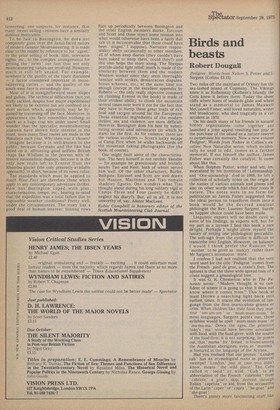Birds and beasts
Robert Dougall
Pedigree: Words from Nature S. Potter and L. Sargent (Collins £3.15).
Two miles off the mainland of Orkney lies the sea-lashed island of Copinsay. The Vikings knew it as Kolbeinsay (Kolbein's Island); the Celts knew it before them. Today the sheer cliffs where hosts of seabirds glide and wheel stand as a memorial to James Maxwell McConnell Fisher, well loved naturalist, writer and broadcaster, who died tragically in a car accident in 1970.
On his death many of his friends in natural history organisations came together and launched a joint appeal resulting last year in the purchase of the island as a nature reserve to perpetuate his memory. Now a new volume Pedigree; Words from Nature in Collins's excellent New Naturalist series, which incidentally he used to edit, conies as a further memorial. If not himself the author, James Fisher was certainly the catalyst. It came about like this.
When Stephen Potter, writer and wit, immortalised by his invention of ' Lifemanship' and 'One-upmanship died in 1969, he left a collection of scholarly notes on the origin of the names of various animals and plants and also on other words which had their roots in nature, The notes were in no form for publication so James Fisher suggested that the ideal person to transform them into a book would be the devoted amateur philologist the Rev. Laurens Sargent. Surely no happier choice could have been made.
Linguistic experts will no doubt cavil at some of his findings, as experts will, but for my part as a layman I find this book a rare delight. Perhaps I might allow myself the luxury of noting one philological peccadillo. The soft-sign from the cyrillic is difficult to transcribe into English. However, on balance, 1 would I think prefer the Russian for ' mother ' to be given as ' mat(y)' rather thorn Mr Sargent's incestuous ' mate.'
I confess I had not realised that the very word used for the title ' Pedigree ' comes from the French pied de grue, a crane's foot. The aptness is that the three wide spread toes of a crane suggest a genealogical tree. It was G. K. Chesterton who in The Futurists wrote: "Modern thought is so confident of where it is going to that it does not know where it comes from." This book at least throws a searching light back into earliest times. It traces the evolution of language from the first inarticulate grunts or cries. When children like their food they murmur ' um-urn-um ' or 'mum-mom-mum.' In most languages, Sargent points out, these syllables would be spelt mam-mam-mam ' or 'ma-ma-ma.' Down the ages. the primitive baby's ' ma ' would have become associated with food, with the food giver, with the source of the food-flow. It is not surprising, he points out, that ' mama ' for ' breast ° is found among the Australian aborigines, even as 'mamma is featured in the language of the Aryans.
Had you realised that our prosaic 'London cab' has its etymological roots in primeval swamps? ' London,' just in case you didn't know, means 'the wild place.' The Celts called it ' lond ' or wild. 'Cab' is an abbreviation of the French 'cabriolet' from
cabriole,' a goat's skip, derived through Italian ' capriola ' or kid, from the accusative of the Latin ' caper ' or ' capra ' he-goat ' and
she-goat '. There's plenty more fascinating stuff like
that and something for everybody. I hope I may be forgiven for being especially intrigued by the origins of bird names. The scientific name for the nightjar is ' Caprimulgus,' or goatsucker: So called because at dusk the birds would be seen catching the beetles and insects attracted by the droppings and rank smell of the goats. That was enough for primitive folk, even for some of our eighteenth century English farmers to be convinced that the nightjar did in fact milk their herds. But then of course up to that time it was also believed that swallows did not migrate but spent the winters buried in the mud of ponds and streams. The aigrette,' a spray once fashionable as a head decoration, took its name from the little egret. It was principally in order to stamp out the plumage trade that the Royal Society for the Protection of Birds was formed in this country in the last decade of the Victorian era. Many of the delicate plumes were plucked from the living birds in the marshes of southern Spain and sent to London milliners. They, perhaps meaning to call the feathers a 'spray,' became confused by another bird and called them 'ospreyplumes.' To the great credit of the young K.S.P.B. in 1921 it was made illegal to import them into Britain. This book is such a mine of erudition that I hesitate to carp, but feel I must join issue with Mr Sargent on one point of bird behaviour. The bittern when booming does not raise his bill. First he gives some short grunts, then, after a big intake of breath, slightly lowers his head and booms up to six or more times in succession. Not for nothing have I had a house for many a year within sound of this strange bird in his haunts in the reed beds of East Anglia.
Robert Dougall, well-known as a B.B.C. newscaster, is also an avid ornithologist.











































 Previous page
Previous page